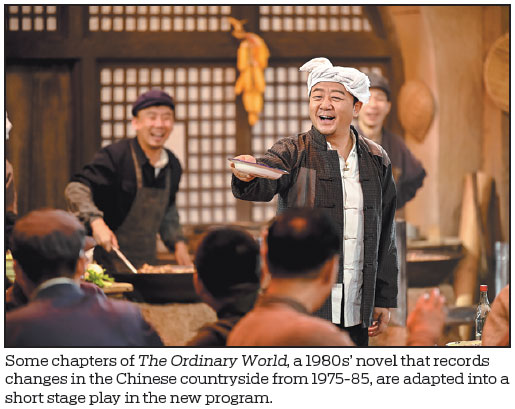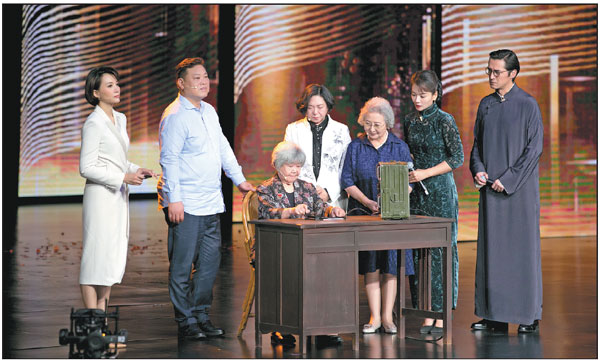Reframing the classics
A new CCTV variety show is restating well-known revolutionary dramas and films to attract younger viewers unfamiliar with the stories of the past, Wang Kaihao reports.
A vast swathe of literary and cinematic classics have been created over the last seven decades of New China's history, although time may have yellowed many of the pages and tarnished much of the celluloid.
Yet in this booming digital era, as people's tastes in entertainment are becoming diverse, how do you tell these old stories to a new generation of viewers in an engaging way? One variety show produced by China Central Television might just have a few ideas.
China in Stories piloted on CCTV 1 on Oct 13, with a new episode being released every week. Mixing stage plays and talk shows in one program, its production team has given nostalgia some new colors.
|
Su Caiqing (center, sitting) sends a message for the heroic Communist intelligence agent Li Bai after she is invited to the new CCTV variety show, China in Stories. Li's story was turned into a 1958 cinematic classic titled The Eternal Wave. Photos Provided to China Daily |
In each of the 11 episodes, well-known chapters from older people's collective memory - whether taken from books or the silver screen - reappear in the form of a stage drama performed by famous actors of different generations.
Dong Qing, a CCTV hostess known for her variety shows with a literary flavor in recent years such as The Readers, will guide viewers to take a behind-the-scenes look at the stories surrounding the birth of these milestone works.
"Whenever an important anniversary for New China comes around, TV producers usually prefer to make documentaries or host galas to celebrate them," Xu Wenguang, deputy director of the CCTV 1, says. "However, the extraordinary journey that our country has gone through needs to be portrayed with more creativity on screen to let the old-time classics live on in today's society."
Even if they have seen these works many times, Chinese viewers born in the 1950s or '60s may still be easily touched by these sentimental moments in the programs recalling revolutionary years.
In The Eternal Wave, a 1958 film, Li Xia, a Communist intelligence agent based in Shanghai during the Chinese Civil War (1946-49), calmly sends his last report and a farewell message by telegraph back to the revolutionary hub in Yan'an, Shaanxi province - even though he knows he has been exposed and will be captured by the Kuomintang within a few minutes.
Yang Zirong from The Taking of the Tiger Mountain, a 1970s film shot in the form of a Peking Opera, was indisputably a superhero in many people's eyes a few decades ago when he sidestepped constant suspicion from his enemies but skillfully solved a dilemma. Adapted from the 1957 novel Tracks in the Snowy Forest and set in Northeast China, the story follows the adventure of a People's Liberation Army soldier as he goes undercover to crush a group of bandits from the inside.
"The stories are just there," Guo Tong, producer of China in Stories, says. "They cannot be left as pearls buried in the dust.
"People's admiration for heroes, patriotism and the pursuit of a great story never change, but the ways to express them do," he says. "There's a gap between these classics and acceptance from the generations of viewers born after 1990 or 2000."
Modern connections
In preparation for the series, the production team searched for comments by young netizens on these classics to look for elements in the old works that made them feel a connection.
And the main challenge for the adaptation was thrown to Tian Qinxin, a veteran drama director from the National Theatre of China. For each episode, she had to turn the key scenes from these household stories into a stage production lasting no longer than half an hour.
"It was a fresh experience to use social media as a new way of guiding audience toward plays," she says. "To mark the 70th anniversary of the founding of New China, the national theater developed a program to remake the classic films made between 1949 and 1966. Coincidentally, the idea for China in Stories echoed with ours, and offered a broader platform for performance."
To attract new viewers, who may not be so familiar with the stories of their parents' generation, Tian also endeavored to break the stereotypes of drama as a highbrow art form enjoyed by a small circle of enthusiasts. Other than the actors and actresses from the National Theatre of China, a group of popular stars from TV and film were invited to join her cast.
And Tian divided the stage into three separate spaces, envisaging the main stage for the performance of major scenes, while the two smaller stages were designed to look like film sets to offer a familiar environment for the actors to adopt screen acting methods and emphasize detail.
"We didn't want overwhelming dramatic effects found in orthodox plays, like long monologues," the director explains. "It's better to mix plays and filmmaking together and make our expressions approachable when concentrating the classics down into short acts."
Scenes dealing with romance and human relationships which were neglected in the original productions in favor of themes of collectivism, are played up in Tian's version to have more of an emotional resonance with younger generations.
In the program, she also includes behind-the-scenes footage, ranging from script read-throughs to live rehearsals.
"We wanted to show how meticulously our plays are made to reflect our respect for history," Tian says.
And her attempts have paid off. On review site Douban, China in Stories received a rating of 8.5 points out of total 10.
One comment gaining the most "likes" reads: "Many classics have been forgotten by time. When we pick them up again, they are not only stories any more. They reflect our respect for our predecessors and an appreciation for the good life we enjoy today."
Bigger picture
Many of the roles in these classic movies featuring a realistic style are based on true stories. Li Xia's experiences are largely based on the ones of real-life agent Li Bai. He was executed by the Kuomintang just 20 days before Shanghai was taken over by the PLA in May 1949.
In the case of Yang Zirong, who in reality died on the battlefield shortly after his skirmish with the bandits, his name even remains unchanged in the novel. Nevertheless, his surviving relatives did not realize this national hero belonged to their family until 27 years later, when they saw the fallen hero's last surviving picture.
"These 'red classics' do not exclusively belong to any individual or group," Guo, the producer, adds. "They belong to the history of our republic."
Guests like Li Bai's wife and Yang's nephew, as well as actors and writers who involved in the original works, were invited onto the program to recall the old days and talk about how these classics were born. And as they talk, the warm and sentimental moments unfold to gradually build up the history of a country through the individual narratives.
For the show, Su Caiqing, an 87-year-old woman, was invited to be a guest. When she received a set of coded messages by radio in Yan'an in 1948, she did not recognize them as the final signals sent by Li Bai. More than 70 years later from the recording studio, she sends a message back to him: "The twilight you are expecting has come."
And the stories in the show have gone beyond the revolutionary years, and spanned decades to reflect a much broader view of national history.
For example, Red Sorghum, a novel by Nobel Prize-winning author Mo Yan which was adapted into a film by director Zhang Yimou, recalls one episode on the collective memories related to the War Against Japanese Aggression (1931-45) that took place in Shandong province.
The Ordinary World, a novel first published in 1986 which took writer Lu Yao five years to finish, charts the changes taking place in rural Shaanxi province. It tells of the persistent efforts local villagers make to escape poverty in their pursuit of happiness in the wave of reform and opening-up.
And Expectation, a 1990s TV series, successfully portrayed the strong spirit of Chinese women in contemporary society.
"When we look back on these figures again with the wealth of background information in the program," Pang Jingjun, deputy head of China Literature and Art Critics Association, says, "we see our show as a way to complement historical records. As the country continues to march on toward the future, it is always important to review the past."
Zhang Dexiang, a professor at the Communication University of China, says: "These attempts to review our history of art and culture should continue in the long-term, not just for the 70th anniversary. Images of some of our heroes from the olden days can be distorted over time. It's important to use new formats to let people truly understand them."
Contact the writer at wangkaihao@chinadaily.com.cn

(China Daily Global 11/07/2019 page14)



















